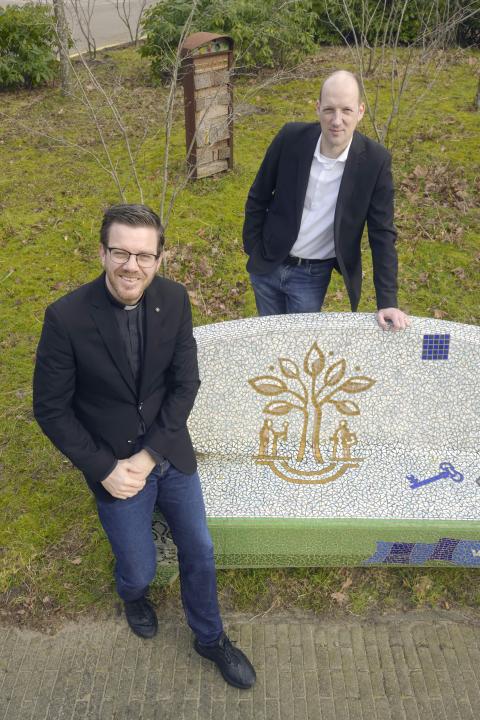Dissatisfaction with the world led to aid for the poor in the Middle Ages
When one thinks of conversion, one thinks of times gone by. Yet the turning away from purely self-centered values is very much alive today. If you read the medieval examples of 'moral turnabout', you will recognize the arguments of the people who criticize material values. They opted for reflection on the good, thereby denouncing the selfishly rich and wishing to work for the poor and for justice. Krijn Pansters of the Franciscan Study Center and Anton ten Klooster of the Thomas Institute Utrecht are organizing an international congress to inspire the present, focusing especially on ethics.
Take the Italian Luchesio Modestino, Franciscan friar of the thirteenth century, who brought in a lot of money as a merchant, but was not satisfied with his life and had empathy with the less fortunate. The poor "may be poor in their pockets, but not poor in their minds," he said. And he wanted to help them. He devoted himself to caring for the sick or taking them to hospitals.
Or see the life of contemporary Peter of Sienna, who had a workshop for making combs. After an unhappy marriage and the death of his wife, he began to care for poor people. He gave away his possessions and entered a Franciscan monastery. However, he continued to work as a comb-maker and gave all the money he earned to the less fortunate.

Pansters: ‘What the examples show is that these people who were converted did not become radically autonomous individuals, but were above all very social beings who thought about good and evil. Even though they might become hermits in a remote area, they remained involved with the people of the world.’
Ten Klooster: 'These moral examples help you to think about yourself.' Pansters: 'They are a short cut to the heart. They inspire to do the right thing and can prompt a turnaround. These people had their faults, some had been reckless in the past, with gambling for example. They show at the same time the imperfection of the world and the possibility that you yourself can change it.'
Transcending your own needs
They came up with the topic during Pansters' research on virtues, asking: where does the process of turning around to do the good begin? Pansters: 'Moral conversion is a process with a turning point, but how do people get there, to that turnaround from focusing on their own needs to what is needed for a better world? To that place where one transcends oneself and connects with shared values and the shared good?'
Ten Klooster: 'I was working on a study of German students who resisted the Nazi regime in World War II: how did they realize that the system was unjust, and how did they decide to resist? So I researched letters and diaries, among other things. Thomas Aquinas showed that you can make good thoughts your own, so that reason and emotion are in harmony. Because you look at things differently when your own emotional orientation is changed. I was interested in the change of values and in particular: not how do we change rules, but how do we change ourselves?'
There was also a social lack in the emerging cities, the lack of a sense of togetherness
Krijn Pansters - Franciscan Study Center
Need for collectivity
The ideas of equality, abolition of poverty and renunciation of material pleasures, were ubiquitous in the Middle Ages, which were not nearly as dark as they are portrayed.
Pansters: 'There was a lot of movement of people and goods in the Middle Ages, just like now. Just like now, good ideas could spread quickly. And the early begging orders moved fast, say, from Bologna to Bolsward. They pointed to the original values for which they were trying to win others, the Christian duty of charity, the gospel, better living. There was also a social lack in the emerging cities, the lack of a sense of togetherness. Brotherhood and service had to take its place before individualism and greed, demonstrated the Friars Minor and Dominicans. The same questions now: which values prevail when we redesign healthcare, when we look at the growing gap of income inequality, the freedom of the citizen, as with 2G?'
Krijn Pansters is a lecturer in Christian spirituality at the Franciscan Study Center. Anton ten Klooster is moral theologian at the Thomas Institute. Both are affiliated with the Tilburg School of Catholic Theology (TST).
In addition to the scientific volume and the discussions of the congress, there should also be a practical guide for implementation, for example through courses in care, community, parish.
More information about the virtual congress on June 29-30 and July 1 and registration are available here.
(By Tineke Bennema)
